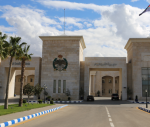You are here
State actualisation of the imperfect state
Oct 07,2017 - Last updated at Oct 07,2017
The national conversation around large-scale corruption and abuse of public sector benefits and services, as well as the epidemic and inappropriate exploitation of access for personal gain versus increasing the tax burden on the citizen, spell out, in my mind, the top concerns of Jordanians today.
It is therefore very significant that His Majesty King Abdullah, in his meeting with the Senate last week, emphasised the need to move towards self-reliance and adopting policies to build the resilience of the poor and middle classes in Jordan.
Prime Minister Hani Mulki carried forward the Royal instructions during a meeting with the newly elected municipal council presidents later in the week, when he declared that the main feature of the financial and structural reform programme — currently being developed by the government — is self-reliance.
To my thinking, this necessarily means that the government will be planning to make a strategic shift that presumably will readjust the state’s political and economic centre — currently almost solely based in the formulas that support the survival of what is essentially a rentier state — towards kick-starting a national process to achieve what I will call state actualisation.
I arrived at “state actualisation” as a term by reflecting on the psychological theory about “self actualisation”, where one undergoes a process of growth as an individual in order to recognise and fulfil one’s highest need.
Beautifully, I think, this process also includes recognising that imperfections are not only okay, but they are perfect. It is through accepting those imperfections and going beyond them that one becomes a “fully functioning person” who has recognised the “real or actual self” rather than one’s “ideal self”.
Without overworking the idea when transposing it to the process that would lead to state actualisation, I believe it is clear that Jordan is at a crossroads again, and needs to undertake several critical tasks to launch it forward, realistically, rejuvenating a “fully functioning” and self-reliant state, a process that is also imperfectly real and achievable.
The financial and structural policies and tasks the government must undertake to achieve this objective are obviously the remit of qualified experts and I would not claim to fully understand what they would entail. However, I know that whatever they end up being, they will not succeed without the government addressing other equally pressing challenges in parallel.
The government must have the full confidence, allegiance and commitment to stability of all its citizens at all times — and regardless of the sacrifices they must make — in order to make sure that we stay secure and resilient as a state.
Many Jordanians believe that the biggest threat to our security today would be a government that does not take serious measures to regain the confidence of the Jordanian people by openly addressing their concerns over inequity, corruption and misuse of privilege and access, and systematically putting in place steps that showcase the government’s commitment to addressing these concerns once and for all.
Without mincing words, what the government must tackle head on is obvious: nepotism, favouritism, sanctioned corruption and “turning a blind eye” cannot continue to be state tools used for political negotiations; assigning executive decision-making authority and positions to the inept and under-qualified as political favour must stop; citizenship of Jordan must guarantee equal rights to all citizens, regardless of race, religion, language, ethnic origin, tribal/family affiliation, class/economic ability and, most importantly in my opinion, gender; these rights must be inalienable, safeguarded and guaranteed by an independent judiciary and a credible democratic system in touch with the people and their priorities.
Our imperfect state will continue to be influenced by tumultuous political and economic conditions dictated by our limited natural resources, geographic location and the confines imposed on Jordan by the international and regional balance of power.
We also know that the requirements of our political history and survival will continue to challenge our “ideal” wish on key political issues that Jordanians have internalised and accepted a long time ago.
Our ability and commitment to absorbing refugees from neighbouring countries will fluctuate, but will always be a feature of our prescribed role as a host country.
These “imperfections”, I suspect, will not change. But what must change, and immediately, is our credibility and authenticity as a system of government and governance.













